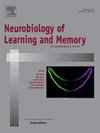雌性大鼠急性应激后,尽管计划结构和行动序列执行发生了变化,但仍保留了目标导向的行动序列计划。
IF 1.8
4区 心理学
Q3 BEHAVIORAL SCIENCES
引用次数: 0
摘要
当在压力下做决定时,生物体往往会减少深思熟虑,并依赖于自动习惯。先前对压力对决策影响的调查主要将目标方向和习惯视为静态环境中独立和竞争的控制来源。急性应激对分层规划解决动态任务中目标方向和习惯的整合的影响尚不清楚。在这里,我们的目的是评估压力是否会促使习惯性动作序列的使用,而不是在一系列决策任务中选择离散的目标导向动作。我们训练了16只雌性Long Evans大鼠进行两阶段二元选择任务,并进行了两个探针测试,一个是在急性约束条件下,另一个是在控制条件下,以确定压力如何影响高级行为计划和中间行动结构。我们发现,在应激和控制条件下,大鼠都表现出目标导向的习惯性动作序列计划。然而,在压力下,大鼠表现出更大的倾向于重复独立于强化的行动序列,这表明压力可能导致对行动计划探索的厌恶。压力也增加了反应之间的延迟——尽管保留了它们的整体结构和性能,但降低了动作序列的完整性。综上所述,这些发现表明,尽管急性压力不会破坏两阶段决策行为的整体宏观结构,但它确实会单独改变目标导向和习惯控制的微观结构。此外,这些结果暗示应激对雌性大鼠目标方向的损害程度可能取决于决策环境的激励结构和注意需求。本文章由计算机程序翻译,如有差异,请以英文原文为准。
Female rats retain goal-directed planning of action sequences after acute stress despite changes in planning structure and action sequence execution
When making decisions under stress, organisms tend to deliberate less and rely on automatic habits. Prior investigation into the influence of stress on decision-making has primarily viewed goal-direction and habit as independent and competitive sources of control in static environments. The effects of acute stress on the integration of goal-direction and habit in hierarchical planning to solve dynamic tasks remain unclear. Here, our aim was to assess whether stress prompted the usage of habitual action sequences over the selection of discrete goal-directed actions in a serial decision task. We trained 16 female Long Evans rats in a two-stage binary choice task and performed two probe tests, one following acute restraint stress and one under control conditions, to identify how stress affected higher-level planning of behavior and intermediate action structures. We found that under both stressed and control conditions, rats exhibited goal-directed planning of habitual action sequences. However, following stress, rats showed a greater tendency to reiterate action sequences independent of reinforcement, indicating that stress may induce an aversion to exploration in action planning. Stress also increased the latency between responses – degrading action sequence integrity despite conserving their overall structure and performance. Taken together, these findings suggest that although acute stress does not disrupt the overall macrostructure of behavior in two-stage decision-making, it does alter the microstructure of goal-directed and habitual control individually. Further, these results imply that the extent to which stress impairs goal-direction in female rats may depend on the incentive structure and attentional demands of the decision environment.
求助全文
通过发布文献求助,成功后即可免费获取论文全文。
去求助
来源期刊
CiteScore
5.10
自引率
7.40%
发文量
77
审稿时长
12.6 weeks
期刊介绍:
Neurobiology of Learning and Memory publishes articles examining the neurobiological mechanisms underlying learning and memory at all levels of analysis ranging from molecular biology to synaptic and neural plasticity and behavior. We are especially interested in manuscripts that examine the neural circuits and molecular mechanisms underlying learning, memory and plasticity in both experimental animals and human subjects.

 求助内容:
求助内容: 应助结果提醒方式:
应助结果提醒方式:


